Module 2 Unit 3 Moving home 课件(共100张PPT)
文档属性
| 名称 | Module 2 Unit 3 Moving home 课件(共100张PPT) |
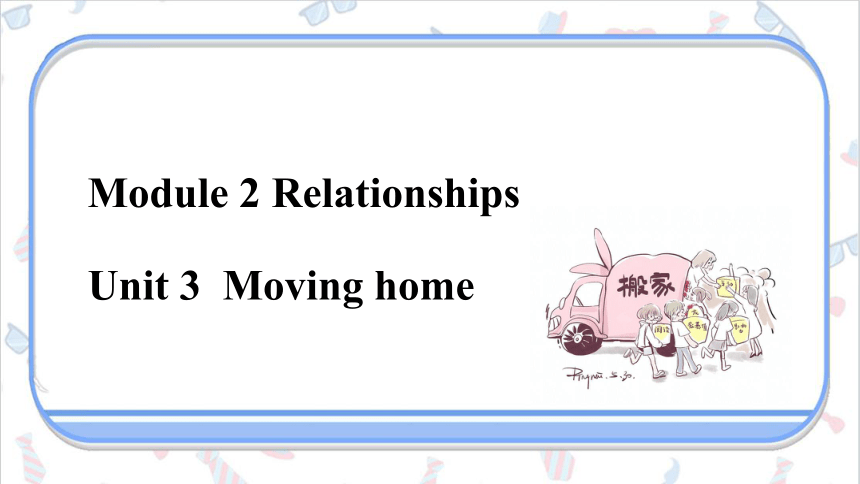
|
|
| 格式 | pptx | ||
| 文件大小 | 11.3MB | ||
| 资源类型 | 试卷 | ||
| 版本资源 | 牛津上海版(试用本) | ||
| 科目 | 英语 | ||
| 更新时间 | 2023-11-20 10:10:46 | ||
图片预览

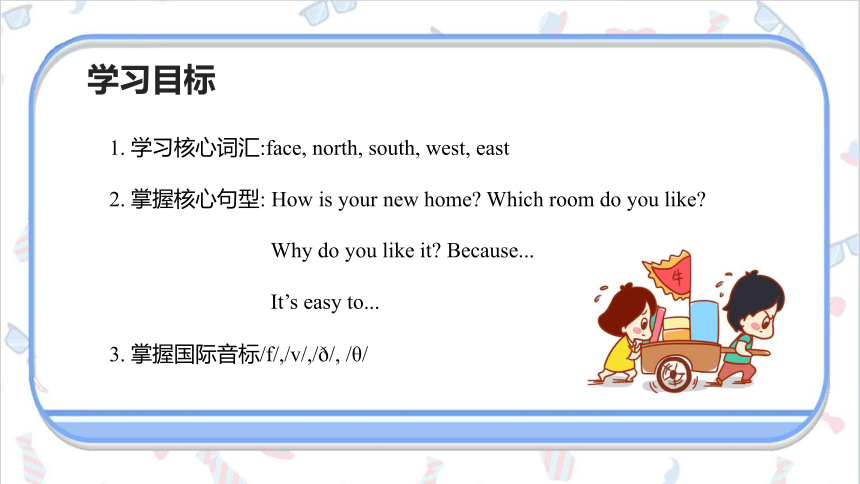



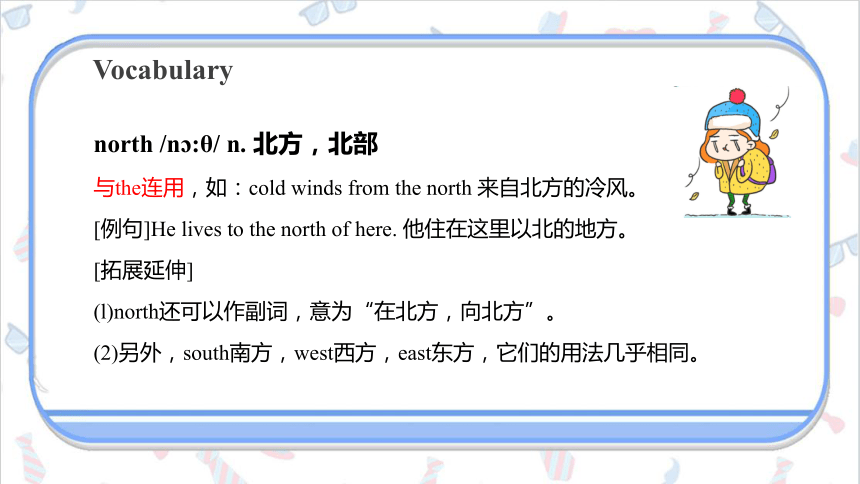

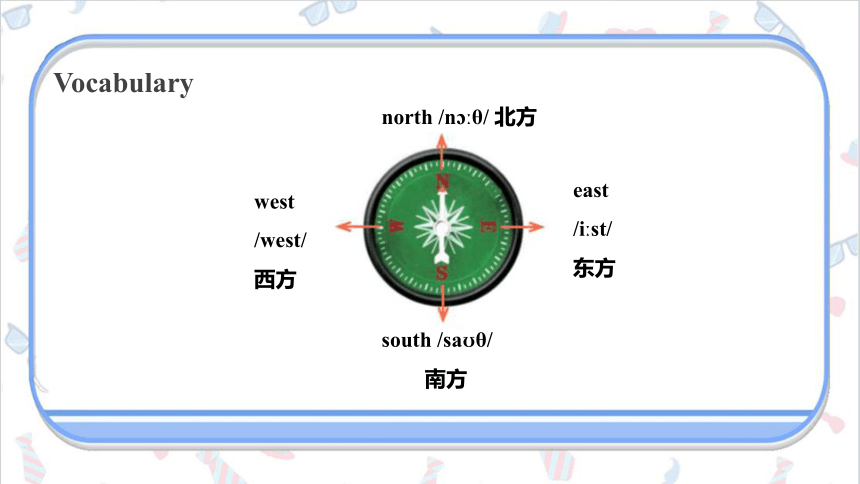

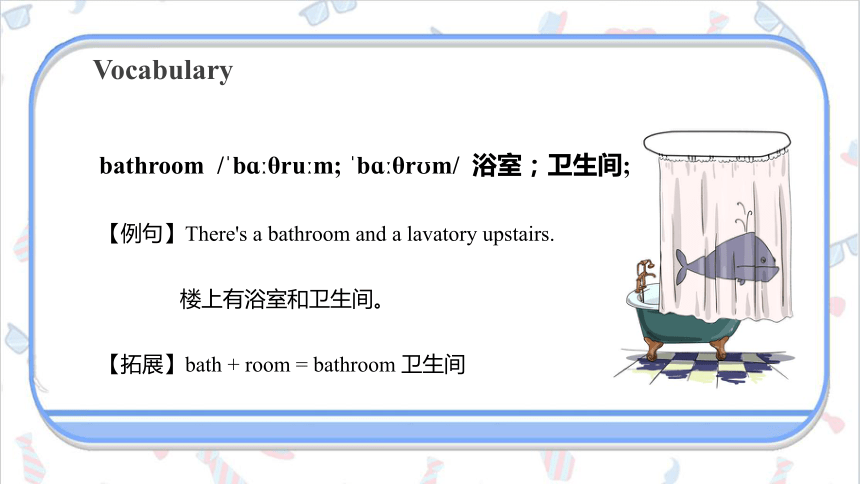
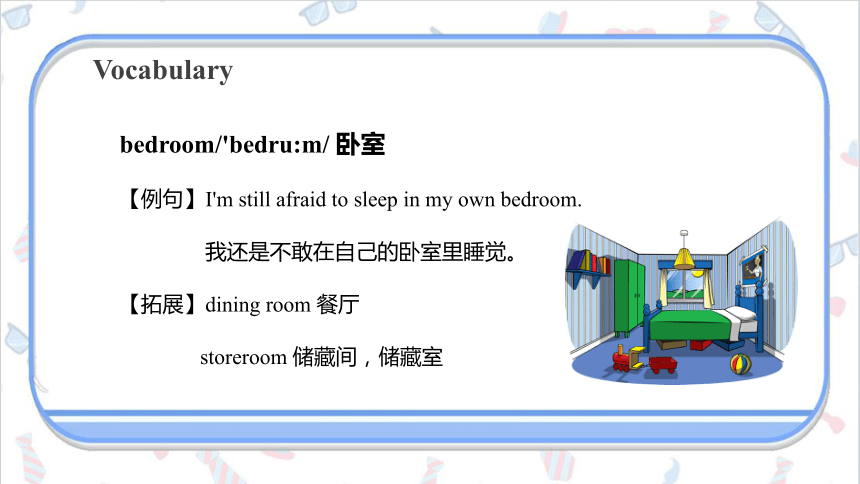

文档简介
(共100张PPT)
Module 2 Relationships
Unit 3 Moving home
学习目标
1. 学习核心词汇:face, north, south, west, east
2. 掌握核心句型: How is your new home Which room do you like
Why do you like it Because...
It’s easy to...
3. 掌握国际音标/f/,/v/,/ /, /θ/
Can you talk about your home
Do you like it Why
Vocabulary
01
Grammar
03
Text
02
Practice
04
CONTENTS
PART 01
Vocabulary
Vocabulary
north /n :θ/ n. 北方,北部
与the连用,如:cold winds from the north 来自北方的冷风。
[例句]He lives to the north of here. 他住在这里以北的地方。
[拓展延伸]
(l)north还可以作副词,意为“在北方,向北方”。
(2)另外,south南方,west西方,east东方,它们的用法几乎相同。
Vocabulary
朝向某个方向,用动词face来表达。
如:The living room faces south.
起居室是朝南的。
方位名词常用于“the+方位词 +of...”结构中, 表示“…部”。
She works in the north of China.
她在中国的北部工作。
Vocabulary
north /n θ/ 北方
south /sa θ/
南方
west
/west/
西方
east
/i st/
东方
Vocabulary
living room/'livim ru:m/ 客厅;起居室;
【例句】We are sitting on the couch in the living room.
我们正坐在客厅的沙发上。
Vocabulary
bathroom / bɑ θru m; bɑ θr m/ 浴室;卫生间;
【例句】There's a bathroom and a lavatory upstairs.
楼上有浴室和卫生间。
【拓展】bath + room = bathroom 卫生间
bedroom/'bedru:m/ 卧室
【例句】I'm still afraid to sleep in my own bedroom.
我还是不敢在自己的卧室里睡觉。
【拓展】dining room 餐厅
storeroom 储藏间,储藏室
Vocabulary
Vocabulary
kitchen / k t n/ 厨房
【例句】She's in the kitchen.她在厨房里。
【拓展】 in the kitchen 在厨房里
dining room/'bedru:m/ 餐厅
【例句】I'm still afraid to sleep in my own bedroom.
我还是不敢在自己的卧室里睡觉。
【拓展】dining room 餐厅
storeroom 储藏间,储藏室
Vocabulary
Vocabulary
拓展:构词法记单词
live +room=livingroom roommate 室友
class+room=classroom 教室 mushroom 蘑菇waiting+room=waitingroom 候车室 dressingroom 更衣室
Vocabulary
attic / t k/ 阁楼
【例句】We're making our attic into an extra bedroom.
我们要把阁楼改装一下,增加一间卧室。
Vocabulary
garage / ɡ rɑ / 车库;
【例句】I left my car at the garage.
我把车停在车库了。
Vocabulary
basement / be sm nt/ 地下室
【例句】A safe place could be a basement or the lowest floor.
安全的地方也许是地下室,或是最低楼层。
Vocabulary
garden / ɡɑ d( )n/ 公园;
【例句】I've been digging the garden.
我一直在花园松土。
study /'st di/ n. 书房
study在本单元作名词,意为“书房”。
[例句]There are many books in the study. 书房里有许多书。
[拓展延伸]study还可以作动词,意为“学习;研究”。
[例句]He wants to study Chinese with me. 他想和我一起学习中文。
Vocabulary
Vocabulary
move /mu:v/ v. 搬动
(1) 使移动,搬动;开动
[例句]That chair is in the way, move it please. 那把椅子挡着路,请把它移开。
(2) 使感动[(+to)]
[例句]They were much moved by her story. 他们被她的故事深深打动。
Vocabulary
change /t eind / v. 变化
【例句】I want to change my job. 我想换我的工作。
【拓展延伸】change也可以作名词“变化”的意思。如:
a change in the weather 天气的变化
wild goose 大雁
这是一个合成词,由wild (野生的)和goose(鹅)构成。
其复数形式为:wild geese,同goose变复数一样。
名词变复数通过只变内部元音字母的单词还有:
man—men woman—women tooth—teeth foot—feet
Vocabulary
a lot of = lots of 许多,大量
既可以修饰不可数名词,又可以修饰可数名词。
[例句]There are a lot of boys in the playground.
操场上有许多男孩子。
Vocabulary
Vocabulary
attic /b f (r)/ 在…以前; (次序或排列) 在前面;
【例句】He arrived before me.他比我先到。
【拓展】before lunch午餐前 ; the day before yesterday 前天
【反义词】after 在…..之后
Vocabulary
Try to find out 'east, west, south and west' in the map.
1. Fill in the blanks.
(1) Shanghai is in the of China.
(2) Tibet is in the of China.
(3) Russia is to the of China.
(4) I have friends in school.
(5) Every day I read books in my .
PART 02
Text
Listen and say.
The Chens have a new home.
Dad: Are you happy with our new home, Sally
Sally: Yes, it's lovely.
Dad: Which room do you like
Sally: Hmm, I like the living room.
Dad: Why
Sally: Because it's so big! And it faces south. There's a lot of sunshine. What about you, Dad
1. the + 姓氏复数,表示:...一家人
the Chens指陈一家人
2. Which room 哪一个
3. face south 朝南
4. a lot of + 可数名词复数/ 不可数名词
Dad: I like the study.
Sally: Why do you like it
Dad: Because it's quiet. I can read books there. Where are Peter and Paul
Sally: They're in the garden. They like our new home too. I know why.
Dad: Why
Sally: Because they can play in the garden all day!
Ask and answer.
Look at the floor plans of Mary's and John's homes. Then ask and answer the questions in pairs.
John's home Mary's home
Ask and answer.
S1: Do you like Mary's home or John's home Why
S2: I like... Because...
Say and act.
Say and act.
Peter's new home
Peter is telling Danny about his new home.
Danny: How's your new home, Peter
Peter: It's very nice.
Danny: How many bedrooms are there
Peter: There are three bedrooms. Paul and I share one bedroom. My mum and
dad have a bedroom. Sally has a bedroom.
1. how询问方式或状态,翻译成:怎么样
2. share分享,常与with搭配
Say and act.
Danny:Do you like your room
Peter:Yes, it's great.
Danny:Why do you like it
Peter:Because it faces south. The sun shines through the window in the morning.
Danny: That's nice. Is your new home far from school
Peter: No. It only takes 20 minutes by bus.
Danny: It sounds great.
1. through 内部穿过
2. far from….. 离…远
3. take 花费(时间)
4. sound+形容词 听起来...
Look and read
Look and read
Why do wild geese move In winter, they cannot find enough food in the north. When spring comes, they miss their home in the north and fly back.
Look and read
T
F
T
True or false
( )1 Wild geese change homes every year.
( )2 Wild geese live in the north in winter.
( )3 Wild geese cannot find enough food in the north.
wild geese 大雁,单数: wild goose fly to 飞向
change v. 改变 move v. 搬家
enough 足够的, enough+名词,
表示:足够的…..形容词+enough,表示:足够….
如: good enough 足够好
Listen and enjoy
Why Why
Why is the sky blue
Why do the clouds move
Why Why
Why do my grandparents get old
Why must I go to school
Listen and enjoy
Why Why
Why do you always get up early, Mum
Why do you always work late, Dad
Why Why
Learn the sounds
PART 03
Grammar
1. Wh-questions: Why do you like it
Which room do you like Where are Peter and Paul
2. 连词because用来回答why提出的问题。
[例句]—Why do you like it 你为什么喜欢它
—Because it faces south. 因为它朝南。
[拓展延伸]because还可以引导原因状语从句。
[例句]She didn't come to school because she is ill. 她没来上学是因为她病了。
There be 句型句子结构和基本概念及与 have/has的区别
基本概念:表示在某处存在某物/人
句子结构: There be + 某物/人 + 地点状语。
区别:have/has表示某人拥有某物。
例1. There is a boy on the grass.
例2. There is a dog behind the boy.
There be句型的定义
There be 句型表示 某地有某物/ 某人。
eg: There is a river in the forest.森林里有一条河。
There are many apples on the tree.树上有很多苹果。
A. There is+单数可数名词/不可数名词+地点.
e.g. There is a book on the desk.书桌上有一本书。
There is some water in the bottle.瓶子里有些水。
B. There are+复数名词+地点.
e.g. There are some apples in the basket.篮子里有一些苹果。
There be句型--肯定句
A. There is not (isn't) +单数可数名词/不可数名词+地点.
e.g. There isn't a book on the desk.书桌上没有书。
There isn't any water in the bottle.瓶子里没有水。
B. There are not (aren't) +复数名词+地点.
e.g. There aren't any apples in the basket.篮子里没有苹果。
some在否定句&疑问句中变为any!
There be句型--否定句
A. Is there+单数可数名词/不可数名词+地点
e.g. Is there a book on the desk 课桌上有书吗
Is there any water in the bottle 瓶子里有水吗
B. Are there+复数名词+地点
e.g. Are there any apples in the basket 篮子里有苹果吗
There be句型--一般疑问句
A.某物在哪里
Where is + 单数名词/不可数名词
Where are + 复数名词
B.某处有多少某物
How many +数名词+ are there + 地点
How much + 不可数名词 + is there + 地点
There be句型--特殊疑问句
There is 和there are
就近原则,也称“邻近原则” ,即谓语与靠近的名词、代词(有时不一定是主语)在人称和数的变化上保持一致。
即在There be句型中,be动词应和其后出现的主语在数上一致。
选择用are或is填空。
1.There____ an apple on the table.
2.There _____ two bananas on the table.
3.There _____ a pear and two strawberries on the bed.
4.There _____ two pears and a strawberry on the bed.
5.There _______ a book, a pen and a pencil in the schoolbag.
There_______ a bottle of water and two cherries on the table.
There_______ two oranges and a peach on the table.
There ________ some rice and two oranges on the table.
There be 和 have/has
区别
There are two students in the classroom.教室里有两个学生。
He has a toy bear.他有一个玩具熊。
1.所属关系: there be表示某时或某地“存在”某人或某物;
have, has强调“拥有”
2.排列位置: there be置于句首; have, has放在句中。
There be句型的句型转换
1.否定句: There + be动词+ not+其他.
There isn't an apple on the desk.
2.一般疑问句: be动词+there +其他
肯定回答: Yes, there is/are.否定回答: No, there isn't/aren't.
当there be句中有some,变否定句或者一般疑问句需要把some变为any.
There be 句型 改否定句的方法
1. 直接否定 be 动词,在be动词后加not,可以缩写。
2. 陈述句的some变any. 其中 not any=no, not any 强调一个也没有。
3. 肯定句中两个及两个以上的名词用and连接,否定句中用or连接这些名词。
There be 句型的一般疑问句
There be 句型的一般疑问句是将be动词提前,并且句中如果有some要变any.
肯定回答:Yes, there is/are.
否定回答:No, there isn’t/aren’t.
小口诀: be提前,some变any, 其他不变
汽车里面有3个人。
There are three people in the car.
否定句: There aren't three people in the car.
一般疑问句: Are there three people in the car
There be句型的句型转换
There be 句型特殊疑问句-----对主语提问
特殊的提问方式:
主语是物:What’s + 地点状语?
主语是人:Who’s + 地点状语?
需注意:不管句子中的主语是不是单数,提问都是用单数形式。
【例题精讲】
例1. There are two children under the umbrella.
-- Who’s under the big umbrella
例2. There is a book in her hand.
--What’s in her hand
There be 句型特殊疑问句-----对数量提问
对可数名词: How many + 名词复数 + are there + 地点状语?
(many后面要用are)
对不可数名词: How much + 不可数名词 + is there + 地点状语?
【例题精讲】
例1. There are ten girls in my class. 我的班上有10个女生。
How many girls are there in your class
例2. There is a girl in bed. 床上有个小女孩。
How many girls are there in bed
例3. How many girls are there in the field 田野里有几个女孩?
There is one.
There be 句型特殊疑问句-----对地点状语提问
Where is the +名词单数/不可数名词?
Where are the + 名词复数?
【例题精讲】
例1. There are two children under the umbrella. 大伞下有两个小孩。
--Where are the two children
例2.There is a book in her hand. 她的手里有本书。
--Where is the book
【巩固练习】
对句子划线部分进行提问。
1.There is a shelf in the living room.
_______________________________________________
2.There are some cats in my house.
_______________________________________________
3. There are knives in the kitchen.
_______________________________________________
4. There are some big trees behind our school.
_______________________________________________
PART 04
Sentences
1.Why do you like it 你为什么喜欢它?
Because it's so big! 因为它很大!
why 的意思是“为什么”,我们用 why 来问原因,常用句型是 Why+一般疑问句?
例如 Why are you late for school again
because 意为“因为”,可以用来回答 why 引导的疑问句。
例如 Because my clock doesn't work.
2.Which room do you like 你喜欢哪个房间?
I like the living room. 我喜欢客厅。
关于房间的说法:
living room 客厅;study 书房;
bedroom 卧室;kitchen 厨房;
bathroom 卫生间;dining room 饭厅;basement 地下室
3.Where are Peter and Paul Peter 和 Paul 在 哪 里 ?
【解析】where 用来问地点,表示“在哪里”。
例如 – Where is Peter
– He is in the kitchen.
– Where are Peter and Paul
– They are in the garden.
4.How's your new home, Peter Peter,你的新家怎么样?
解析:我们可以用 How 来问别人的观点和想法。
How is … = What is …like
例如 How is the weather = What is the weather like
5.There are three bedrooms. 有三个房间。
There be 表示“某地有某物”,遵循就近原则。也就是说,最靠近 be 动词的名词如果是单数或不可数名词,be 动词用 is;最靠近 be 动词的名词如果是可数名词复数,be 动词用 are。
例如 There is an orange on the table. There is money in the
study. There are some apples in the kitchen.
6.It faces south. (房间)朝南。
这里的 face 是动词,意思是“朝向”;
“朝向某个方位”可以说 … face(s) …
例如 The windows face north.
7.The sun shines through the window in the morning.
through 表示“从……中穿过,透过”。
go through the forest 穿过森林;
walk through the garden 走过花园
8. Are you happy with our new home, Sally 萨莉,你对我们的新家满意吗?
be happy with意为“对…满意”。
[例句]We are happy with our grades. 我们对自己的成绩很满意。
[拓展延伸]
(l)be happy to do sth [例句]I’m happy to see you. 很高兴见到你。
(2)be happy about sth 因某事而高兴
9. And it faces south. 并且它朝南。
face有很多词性和词义。
(1) 作名词,意为“脸”。如make a face做鬼脸。
(2) 作及物动词,意为“面向,面对,正视,对付”。
[例句]The houses face the river. 这些房子面向这条小河。
The two boys faces each other. 这两个男孩面对面站着。
We should face difficulties. 我们应该正视困难。
(3) 作不及物动词,如本单元所用。
10. Paul and I share one bedroom. 我和保罗共用一个卧室。
(1) share作动词,意为“分享,分担”。
[例句]I share the cost with Mary. 我和玛丽分担费用。
We will share in the work. 我们将分担工作。
(2)作名词,意为“一份”。
[例句]You should do your share.你应该做自己该做的那份事。
11. The sun shines through the window in the morning.
早上阳光透过窗户射进来。
through“穿过”的意思,指的是从物体内部穿过。
如:go through the forest穿过森林。
与它对应的是across,指从物体表面穿过。
如:walk across the street穿过街道。
12. It only takes 20 minutes by bus.坐公交车只需20分钟。
(1)此句所用句型为:It takes sb some time to do sth. 做某事花了某人多长时间。
[例句]It takes me half an hour to do my homework.
我花了半小时做作业。
(2)另一个表花费的句型是:sb spend some time /some money on sth/ in doing sth
[例句]I spend half an hour in doing homework. 我花了半小时做作业。
14. In winter, they cannot find enough food in the north.
冬天它们在北方找不到足够的食物。
enough可以修饰名词或形容词、副词。修饰名词时放在名词前后都可以;修饰形容词、副词时,必须放在后面。
[例句]He is old enough to go to school. 他够大了,可以去上学了。
I have enough time to get to school. 我有足够的时间到学校。
15. When spring comes, they miss their home in the north and fly back.
春天来了,它们想念北方的家,就飞回来了。
miss可以表达“想念,错过”两个意思。
[例句]I miss you very much. 我非常想念你。
I miss the bus. 我错过了公交车。
PART 05
Practice
Judge the sound
( ) 1./ / A. soup B. tool C. put
( ) 2./ / A. many B. map C. take
( ) 3. /i/ A.leave B. very C. each
II. Fill in the blanks( 用所给单词的适当形式填空 )
1. Of all the rooms I like the ___________ ( live ) room very much.
2. It only ___________ (take ) 10 minutes by car.
3. When autumn ___________ ( come ), leaves start _________ ( fall ).
II. Fill in the blanks( 用所给单词的适当形式填空 )
4. These handsome boys are ___________ ( wait ) for a taxi.
5. Why __________ ( do ) he always work late
6. My father is driving __________ ( cross ) the road.
7. I like this room best, because it __________ ( face ) south.
根据句子意思和已给首字母填写单词。
1.Beijing is in the N________ of China, and Shanghai is in the S_______ of China.
2.The chair is in my way, please m_________ it away.
3.There are many c______ in my city. It’s getting more and more beautiful.
4.There are a lot of g_________ on the farm.
5.Nowadays we can see many w________ drivers drive cars.
6.We saw a movie last night. It was a sad but beautiful love story. I was m_______.
7.I have a s______ in my new house. I can study in it in the future.
III. Read and choose. (选择填空)
( ) 1. The Wangs move _________ an old house ________ a new house.
A. from, to B. to, from C. /, to
( ) 2. Grandma is telling us a story __________ Snow White.
A. of B. about C. on
( ) 3. This room ________ south. There’s a lot of sunshine.
A. faces B. to C. from
( ) 4. Is kitty happy__________ her new home Yes, she is.
A. with B. about C. of
( ) 5. Why _________ they like their new house
________ they have a big and bright living room.
A. do, Because B. can, So C. do, But
( ) 6. My brother often shares his toys _________ me.
A. with B. and C. of
( ) 7. ________ are you afraid Because I see a snake on the ground.
A. How B. Why C. What
( ) 8. Here are three books. _________ one do you like I like ________ one.
A. What, the B. What, this C. Which, this
( ) 9. Is your home _________ school Yes. It ________ me an hour by bus.
A. near, take B. far from, takes C. far, uses
Rewrite the following sentences (按要求改写句子)
1. I like my English teacher because she is kind. (划线部分提问)
____________________________________________________________
2. There is lots of sunshine in my new home.( 改为同义句)
The sun _________ __________ the window of my new home.
Rewrite the following sentences (按要求改写句子)
3. Bruce shares a bedroom with Peter. (主语改为Bruce and Peter)
____________________________________________________________
4. My parents are happy. They like our new flat.( 两句合并为一句)
____________________________________________________________
Choose the word or expression which is closest to the underlined part.
1. Some of us will visit our sick teacher in the hospital. ( )
2. I’ll do some shopping at the supermarket. ( )
3. I like the dishes my mother cooks very much. ( )
4. We must also pick up litter and put it into the bin. ( )
A. healthy B. arrive at C. go to see D. throw
E. rubbish F. meet G. enjoy H. friendly I. buy
Choose the word or expression which is closest to the underlined part.
5. The old lady looks pretty well. ( )
6. Let’s run and see who will get to the building first. ( )
7. We went to the airport to welcome Auntie May and her daughter. ( )
8. Do you like reading books ( )
9. My friend Joe is always kind to me. ( )
A. healthy B. arrive at C. go to see D. throw
E. rubbish F. meet G. enjoy H. friendly I. buy
My ideal(理想的) apartment
I'd like my ideal apartment to be in the center of the city and on the 20th floor, from which I can enjoy the beautiful scenery of the city.
I'd like my ideal apartment to be surrounded(围绕) by giant trees and clear rivers. In the morning, I can hear birds singing and water flowing. In the evening, my sister and I can swing on the swing under the tree.
If there is a big balcony(阳台) in my apartment, I'll plant all kinds of flowers there. I'll put a bench there. I can treat myself to a sunbath. I can have a barbeque with my friends. How wonderful it is!
This is my ideal apartment and I love it so much. Maybe it is not the best, but it is perfect in my heart. I can imagine(想象) the picture of a happy life with my family in this amazing apartment.
1. Why does the writer want an apartment in the center of the city
__________________________________________________
2. What will the writer do at the balcony
__________________________________________________
3. Who will live in this apartment
_____________________________________________________
Thank you!
Module 2 Relationships
Unit 3 Moving home
学习目标
1. 学习核心词汇:face, north, south, west, east
2. 掌握核心句型: How is your new home Which room do you like
Why do you like it Because...
It’s easy to...
3. 掌握国际音标/f/,/v/,/ /, /θ/
Can you talk about your home
Do you like it Why
Vocabulary
01
Grammar
03
Text
02
Practice
04
CONTENTS
PART 01
Vocabulary
Vocabulary
north /n :θ/ n. 北方,北部
与the连用,如:cold winds from the north 来自北方的冷风。
[例句]He lives to the north of here. 他住在这里以北的地方。
[拓展延伸]
(l)north还可以作副词,意为“在北方,向北方”。
(2)另外,south南方,west西方,east东方,它们的用法几乎相同。
Vocabulary
朝向某个方向,用动词face来表达。
如:The living room faces south.
起居室是朝南的。
方位名词常用于“the+方位词 +of...”结构中, 表示“…部”。
She works in the north of China.
她在中国的北部工作。
Vocabulary
north /n θ/ 北方
south /sa θ/
南方
west
/west/
西方
east
/i st/
东方
Vocabulary
living room/'livim ru:m/ 客厅;起居室;
【例句】We are sitting on the couch in the living room.
我们正坐在客厅的沙发上。
Vocabulary
bathroom / bɑ θru m; bɑ θr m/ 浴室;卫生间;
【例句】There's a bathroom and a lavatory upstairs.
楼上有浴室和卫生间。
【拓展】bath + room = bathroom 卫生间
bedroom/'bedru:m/ 卧室
【例句】I'm still afraid to sleep in my own bedroom.
我还是不敢在自己的卧室里睡觉。
【拓展】dining room 餐厅
storeroom 储藏间,储藏室
Vocabulary
Vocabulary
kitchen / k t n/ 厨房
【例句】She's in the kitchen.她在厨房里。
【拓展】 in the kitchen 在厨房里
dining room/'bedru:m/ 餐厅
【例句】I'm still afraid to sleep in my own bedroom.
我还是不敢在自己的卧室里睡觉。
【拓展】dining room 餐厅
storeroom 储藏间,储藏室
Vocabulary
Vocabulary
拓展:构词法记单词
live +room=livingroom roommate 室友
class+room=classroom 教室 mushroom 蘑菇waiting+room=waitingroom 候车室 dressingroom 更衣室
Vocabulary
attic / t k/ 阁楼
【例句】We're making our attic into an extra bedroom.
我们要把阁楼改装一下,增加一间卧室。
Vocabulary
garage / ɡ rɑ / 车库;
【例句】I left my car at the garage.
我把车停在车库了。
Vocabulary
basement / be sm nt/ 地下室
【例句】A safe place could be a basement or the lowest floor.
安全的地方也许是地下室,或是最低楼层。
Vocabulary
garden / ɡɑ d( )n/ 公园;
【例句】I've been digging the garden.
我一直在花园松土。
study /'st di/ n. 书房
study在本单元作名词,意为“书房”。
[例句]There are many books in the study. 书房里有许多书。
[拓展延伸]study还可以作动词,意为“学习;研究”。
[例句]He wants to study Chinese with me. 他想和我一起学习中文。
Vocabulary
Vocabulary
move /mu:v/ v. 搬动
(1) 使移动,搬动;开动
[例句]That chair is in the way, move it please. 那把椅子挡着路,请把它移开。
(2) 使感动[(+to)]
[例句]They were much moved by her story. 他们被她的故事深深打动。
Vocabulary
change /t eind / v. 变化
【例句】I want to change my job. 我想换我的工作。
【拓展延伸】change也可以作名词“变化”的意思。如:
a change in the weather 天气的变化
wild goose 大雁
这是一个合成词,由wild (野生的)和goose(鹅)构成。
其复数形式为:wild geese,同goose变复数一样。
名词变复数通过只变内部元音字母的单词还有:
man—men woman—women tooth—teeth foot—feet
Vocabulary
a lot of = lots of 许多,大量
既可以修饰不可数名词,又可以修饰可数名词。
[例句]There are a lot of boys in the playground.
操场上有许多男孩子。
Vocabulary
Vocabulary
attic /b f (r)/ 在…以前; (次序或排列) 在前面;
【例句】He arrived before me.他比我先到。
【拓展】before lunch午餐前 ; the day before yesterday 前天
【反义词】after 在…..之后
Vocabulary
Try to find out 'east, west, south and west' in the map.
1. Fill in the blanks.
(1) Shanghai is in the of China.
(2) Tibet is in the of China.
(3) Russia is to the of China.
(4) I have friends in school.
(5) Every day I read books in my .
PART 02
Text
Listen and say.
The Chens have a new home.
Dad: Are you happy with our new home, Sally
Sally: Yes, it's lovely.
Dad: Which room do you like
Sally: Hmm, I like the living room.
Dad: Why
Sally: Because it's so big! And it faces south. There's a lot of sunshine. What about you, Dad
1. the + 姓氏复数,表示:...一家人
the Chens指陈一家人
2. Which room 哪一个
3. face south 朝南
4. a lot of + 可数名词复数/ 不可数名词
Dad: I like the study.
Sally: Why do you like it
Dad: Because it's quiet. I can read books there. Where are Peter and Paul
Sally: They're in the garden. They like our new home too. I know why.
Dad: Why
Sally: Because they can play in the garden all day!
Ask and answer.
Look at the floor plans of Mary's and John's homes. Then ask and answer the questions in pairs.
John's home Mary's home
Ask and answer.
S1: Do you like Mary's home or John's home Why
S2: I like... Because...
Say and act.
Say and act.
Peter's new home
Peter is telling Danny about his new home.
Danny: How's your new home, Peter
Peter: It's very nice.
Danny: How many bedrooms are there
Peter: There are three bedrooms. Paul and I share one bedroom. My mum and
dad have a bedroom. Sally has a bedroom.
1. how询问方式或状态,翻译成:怎么样
2. share分享,常与with搭配
Say and act.
Danny:Do you like your room
Peter:Yes, it's great.
Danny:Why do you like it
Peter:Because it faces south. The sun shines through the window in the morning.
Danny: That's nice. Is your new home far from school
Peter: No. It only takes 20 minutes by bus.
Danny: It sounds great.
1. through 内部穿过
2. far from….. 离…远
3. take 花费(时间)
4. sound+形容词 听起来...
Look and read
Look and read
Why do wild geese move In winter, they cannot find enough food in the north. When spring comes, they miss their home in the north and fly back.
Look and read
T
F
T
True or false
( )1 Wild geese change homes every year.
( )2 Wild geese live in the north in winter.
( )3 Wild geese cannot find enough food in the north.
wild geese 大雁,单数: wild goose fly to 飞向
change v. 改变 move v. 搬家
enough 足够的, enough+名词,
表示:足够的…..形容词+enough,表示:足够….
如: good enough 足够好
Listen and enjoy
Why Why
Why is the sky blue
Why do the clouds move
Why Why
Why do my grandparents get old
Why must I go to school
Listen and enjoy
Why Why
Why do you always get up early, Mum
Why do you always work late, Dad
Why Why
Learn the sounds
PART 03
Grammar
1. Wh-questions: Why do you like it
Which room do you like Where are Peter and Paul
2. 连词because用来回答why提出的问题。
[例句]—Why do you like it 你为什么喜欢它
—Because it faces south. 因为它朝南。
[拓展延伸]because还可以引导原因状语从句。
[例句]She didn't come to school because she is ill. 她没来上学是因为她病了。
There be 句型句子结构和基本概念及与 have/has的区别
基本概念:表示在某处存在某物/人
句子结构: There be + 某物/人 + 地点状语。
区别:have/has表示某人拥有某物。
例1. There is a boy on the grass.
例2. There is a dog behind the boy.
There be句型的定义
There be 句型表示 某地有某物/ 某人。
eg: There is a river in the forest.森林里有一条河。
There are many apples on the tree.树上有很多苹果。
A. There is+单数可数名词/不可数名词+地点.
e.g. There is a book on the desk.书桌上有一本书。
There is some water in the bottle.瓶子里有些水。
B. There are+复数名词+地点.
e.g. There are some apples in the basket.篮子里有一些苹果。
There be句型--肯定句
A. There is not (isn't) +单数可数名词/不可数名词+地点.
e.g. There isn't a book on the desk.书桌上没有书。
There isn't any water in the bottle.瓶子里没有水。
B. There are not (aren't) +复数名词+地点.
e.g. There aren't any apples in the basket.篮子里没有苹果。
some在否定句&疑问句中变为any!
There be句型--否定句
A. Is there+单数可数名词/不可数名词+地点
e.g. Is there a book on the desk 课桌上有书吗
Is there any water in the bottle 瓶子里有水吗
B. Are there+复数名词+地点
e.g. Are there any apples in the basket 篮子里有苹果吗
There be句型--一般疑问句
A.某物在哪里
Where is + 单数名词/不可数名词
Where are + 复数名词
B.某处有多少某物
How many +数名词+ are there + 地点
How much + 不可数名词 + is there + 地点
There be句型--特殊疑问句
There is 和there are
就近原则,也称“邻近原则” ,即谓语与靠近的名词、代词(有时不一定是主语)在人称和数的变化上保持一致。
即在There be句型中,be动词应和其后出现的主语在数上一致。
选择用are或is填空。
1.There____ an apple on the table.
2.There _____ two bananas on the table.
3.There _____ a pear and two strawberries on the bed.
4.There _____ two pears and a strawberry on the bed.
5.There _______ a book, a pen and a pencil in the schoolbag.
There_______ a bottle of water and two cherries on the table.
There_______ two oranges and a peach on the table.
There ________ some rice and two oranges on the table.
There be 和 have/has
区别
There are two students in the classroom.教室里有两个学生。
He has a toy bear.他有一个玩具熊。
1.所属关系: there be表示某时或某地“存在”某人或某物;
have, has强调“拥有”
2.排列位置: there be置于句首; have, has放在句中。
There be句型的句型转换
1.否定句: There + be动词+ not+其他.
There isn't an apple on the desk.
2.一般疑问句: be动词+there +其他
肯定回答: Yes, there is/are.否定回答: No, there isn't/aren't.
当there be句中有some,变否定句或者一般疑问句需要把some变为any.
There be 句型 改否定句的方法
1. 直接否定 be 动词,在be动词后加not,可以缩写。
2. 陈述句的some变any. 其中 not any=no, not any 强调一个也没有。
3. 肯定句中两个及两个以上的名词用and连接,否定句中用or连接这些名词。
There be 句型的一般疑问句
There be 句型的一般疑问句是将be动词提前,并且句中如果有some要变any.
肯定回答:Yes, there is/are.
否定回答:No, there isn’t/aren’t.
小口诀: be提前,some变any, 其他不变
汽车里面有3个人。
There are three people in the car.
否定句: There aren't three people in the car.
一般疑问句: Are there three people in the car
There be句型的句型转换
There be 句型特殊疑问句-----对主语提问
特殊的提问方式:
主语是物:What’s + 地点状语?
主语是人:Who’s + 地点状语?
需注意:不管句子中的主语是不是单数,提问都是用单数形式。
【例题精讲】
例1. There are two children under the umbrella.
-- Who’s under the big umbrella
例2. There is a book in her hand.
--What’s in her hand
There be 句型特殊疑问句-----对数量提问
对可数名词: How many + 名词复数 + are there + 地点状语?
(many后面要用are)
对不可数名词: How much + 不可数名词 + is there + 地点状语?
【例题精讲】
例1. There are ten girls in my class. 我的班上有10个女生。
How many girls are there in your class
例2. There is a girl in bed. 床上有个小女孩。
How many girls are there in bed
例3. How many girls are there in the field 田野里有几个女孩?
There is one.
There be 句型特殊疑问句-----对地点状语提问
Where is the +名词单数/不可数名词?
Where are the + 名词复数?
【例题精讲】
例1. There are two children under the umbrella. 大伞下有两个小孩。
--Where are the two children
例2.There is a book in her hand. 她的手里有本书。
--Where is the book
【巩固练习】
对句子划线部分进行提问。
1.There is a shelf in the living room.
_______________________________________________
2.There are some cats in my house.
_______________________________________________
3. There are knives in the kitchen.
_______________________________________________
4. There are some big trees behind our school.
_______________________________________________
PART 04
Sentences
1.Why do you like it 你为什么喜欢它?
Because it's so big! 因为它很大!
why 的意思是“为什么”,我们用 why 来问原因,常用句型是 Why+一般疑问句?
例如 Why are you late for school again
because 意为“因为”,可以用来回答 why 引导的疑问句。
例如 Because my clock doesn't work.
2.Which room do you like 你喜欢哪个房间?
I like the living room. 我喜欢客厅。
关于房间的说法:
living room 客厅;study 书房;
bedroom 卧室;kitchen 厨房;
bathroom 卫生间;dining room 饭厅;basement 地下室
3.Where are Peter and Paul Peter 和 Paul 在 哪 里 ?
【解析】where 用来问地点,表示“在哪里”。
例如 – Where is Peter
– He is in the kitchen.
– Where are Peter and Paul
– They are in the garden.
4.How's your new home, Peter Peter,你的新家怎么样?
解析:我们可以用 How 来问别人的观点和想法。
How is … = What is …like
例如 How is the weather = What is the weather like
5.There are three bedrooms. 有三个房间。
There be 表示“某地有某物”,遵循就近原则。也就是说,最靠近 be 动词的名词如果是单数或不可数名词,be 动词用 is;最靠近 be 动词的名词如果是可数名词复数,be 动词用 are。
例如 There is an orange on the table. There is money in the
study. There are some apples in the kitchen.
6.It faces south. (房间)朝南。
这里的 face 是动词,意思是“朝向”;
“朝向某个方位”可以说 … face(s) …
例如 The windows face north.
7.The sun shines through the window in the morning.
through 表示“从……中穿过,透过”。
go through the forest 穿过森林;
walk through the garden 走过花园
8. Are you happy with our new home, Sally 萨莉,你对我们的新家满意吗?
be happy with意为“对…满意”。
[例句]We are happy with our grades. 我们对自己的成绩很满意。
[拓展延伸]
(l)be happy to do sth [例句]I’m happy to see you. 很高兴见到你。
(2)be happy about sth 因某事而高兴
9. And it faces south. 并且它朝南。
face有很多词性和词义。
(1) 作名词,意为“脸”。如make a face做鬼脸。
(2) 作及物动词,意为“面向,面对,正视,对付”。
[例句]The houses face the river. 这些房子面向这条小河。
The two boys faces each other. 这两个男孩面对面站着。
We should face difficulties. 我们应该正视困难。
(3) 作不及物动词,如本单元所用。
10. Paul and I share one bedroom. 我和保罗共用一个卧室。
(1) share作动词,意为“分享,分担”。
[例句]I share the cost with Mary. 我和玛丽分担费用。
We will share in the work. 我们将分担工作。
(2)作名词,意为“一份”。
[例句]You should do your share.你应该做自己该做的那份事。
11. The sun shines through the window in the morning.
早上阳光透过窗户射进来。
through“穿过”的意思,指的是从物体内部穿过。
如:go through the forest穿过森林。
与它对应的是across,指从物体表面穿过。
如:walk across the street穿过街道。
12. It only takes 20 minutes by bus.坐公交车只需20分钟。
(1)此句所用句型为:It takes sb some time to do sth. 做某事花了某人多长时间。
[例句]It takes me half an hour to do my homework.
我花了半小时做作业。
(2)另一个表花费的句型是:sb spend some time /some money on sth/ in doing sth
[例句]I spend half an hour in doing homework. 我花了半小时做作业。
14. In winter, they cannot find enough food in the north.
冬天它们在北方找不到足够的食物。
enough可以修饰名词或形容词、副词。修饰名词时放在名词前后都可以;修饰形容词、副词时,必须放在后面。
[例句]He is old enough to go to school. 他够大了,可以去上学了。
I have enough time to get to school. 我有足够的时间到学校。
15. When spring comes, they miss their home in the north and fly back.
春天来了,它们想念北方的家,就飞回来了。
miss可以表达“想念,错过”两个意思。
[例句]I miss you very much. 我非常想念你。
I miss the bus. 我错过了公交车。
PART 05
Practice
Judge the sound
( ) 1./ / A. soup B. tool C. put
( ) 2./ / A. many B. map C. take
( ) 3. /i/ A.leave B. very C. each
II. Fill in the blanks( 用所给单词的适当形式填空 )
1. Of all the rooms I like the ___________ ( live ) room very much.
2. It only ___________ (take ) 10 minutes by car.
3. When autumn ___________ ( come ), leaves start _________ ( fall ).
II. Fill in the blanks( 用所给单词的适当形式填空 )
4. These handsome boys are ___________ ( wait ) for a taxi.
5. Why __________ ( do ) he always work late
6. My father is driving __________ ( cross ) the road.
7. I like this room best, because it __________ ( face ) south.
根据句子意思和已给首字母填写单词。
1.Beijing is in the N________ of China, and Shanghai is in the S_______ of China.
2.The chair is in my way, please m_________ it away.
3.There are many c______ in my city. It’s getting more and more beautiful.
4.There are a lot of g_________ on the farm.
5.Nowadays we can see many w________ drivers drive cars.
6.We saw a movie last night. It was a sad but beautiful love story. I was m_______.
7.I have a s______ in my new house. I can study in it in the future.
III. Read and choose. (选择填空)
( ) 1. The Wangs move _________ an old house ________ a new house.
A. from, to B. to, from C. /, to
( ) 2. Grandma is telling us a story __________ Snow White.
A. of B. about C. on
( ) 3. This room ________ south. There’s a lot of sunshine.
A. faces B. to C. from
( ) 4. Is kitty happy__________ her new home Yes, she is.
A. with B. about C. of
( ) 5. Why _________ they like their new house
________ they have a big and bright living room.
A. do, Because B. can, So C. do, But
( ) 6. My brother often shares his toys _________ me.
A. with B. and C. of
( ) 7. ________ are you afraid Because I see a snake on the ground.
A. How B. Why C. What
( ) 8. Here are three books. _________ one do you like I like ________ one.
A. What, the B. What, this C. Which, this
( ) 9. Is your home _________ school Yes. It ________ me an hour by bus.
A. near, take B. far from, takes C. far, uses
Rewrite the following sentences (按要求改写句子)
1. I like my English teacher because she is kind. (划线部分提问)
____________________________________________________________
2. There is lots of sunshine in my new home.( 改为同义句)
The sun _________ __________ the window of my new home.
Rewrite the following sentences (按要求改写句子)
3. Bruce shares a bedroom with Peter. (主语改为Bruce and Peter)
____________________________________________________________
4. My parents are happy. They like our new flat.( 两句合并为一句)
____________________________________________________________
Choose the word or expression which is closest to the underlined part.
1. Some of us will visit our sick teacher in the hospital. ( )
2. I’ll do some shopping at the supermarket. ( )
3. I like the dishes my mother cooks very much. ( )
4. We must also pick up litter and put it into the bin. ( )
A. healthy B. arrive at C. go to see D. throw
E. rubbish F. meet G. enjoy H. friendly I. buy
Choose the word or expression which is closest to the underlined part.
5. The old lady looks pretty well. ( )
6. Let’s run and see who will get to the building first. ( )
7. We went to the airport to welcome Auntie May and her daughter. ( )
8. Do you like reading books ( )
9. My friend Joe is always kind to me. ( )
A. healthy B. arrive at C. go to see D. throw
E. rubbish F. meet G. enjoy H. friendly I. buy
My ideal(理想的) apartment
I'd like my ideal apartment to be in the center of the city and on the 20th floor, from which I can enjoy the beautiful scenery of the city.
I'd like my ideal apartment to be surrounded(围绕) by giant trees and clear rivers. In the morning, I can hear birds singing and water flowing. In the evening, my sister and I can swing on the swing under the tree.
If there is a big balcony(阳台) in my apartment, I'll plant all kinds of flowers there. I'll put a bench there. I can treat myself to a sunbath. I can have a barbeque with my friends. How wonderful it is!
This is my ideal apartment and I love it so much. Maybe it is not the best, but it is perfect in my heart. I can imagine(想象) the picture of a happy life with my family in this amazing apartment.
1. Why does the writer want an apartment in the center of the city
__________________________________________________
2. What will the writer do at the balcony
__________________________________________________
3. Who will live in this apartment
_____________________________________________________
Thank you!
同课章节目录
- Module 1 Getting to know you
- Unit 1 My birthday
- Unit 2 My way to school
- Unit 3 My future
- Module 2 Me, my family and friends
- Unit 1 Grandparents
- Unit 2 Friends
- Unit 3 Moving home
- Module 3 Places and activities
- Unit 1 Around the city
- Unit 2 Buying new clothes
- Unit 3 Seeing the docto
- Module 4 The natural world
- Unit 1 Wate
- Unit 2 Wind
- Unit 3 Fire
